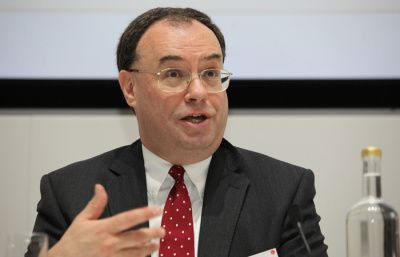
The inflation trend in the UK economy remains “uncertain”, said Bank of England governor Andrew Bailey, adding that growth was likely to slow this year.
“In recent months, the evidence that slack is opening up has strengthened, especially in the labour market,” the central bank head said in a speech at a conference held by the British Chambers of Commerce this morning.
“But there remain uncertainties around the overall balance between supply and demand in the economy as well as the remaining inflation persistence in the system.”
Bailey has blamed second-round price rises in such sectors as “water, energy and private schools” for persistent, or sticky, inflation in the economy.
The cost of living held steady at 3.4% in the 12 months to May last week, according to the latest Office for National Statistics data.
While the nine-member Monetary Policy Committee voted to leave interest rates on hold at 4.25% in a 6-to-3 split last week, with deputy governor Dave Ramsden, Swati Dhingra and Alan Taylor arguing for a 25 basis points cut.
Bailey added that the 0.7% growth in the economy between January and March was stronger than expected, partly due to one-off factors.
The governor said: “First, the unexpected strength in the first quarter was driven by strong outcomes for volatile components of GDP in the monthly figures for March.
“This was possibly a result of front-loading of activity ahead of increases in stamp duty and vehicle exercise duty, and with a temporary boost to trade ahead of the imposition of new tariffs on exports to the US. Consistent with this, monthly GDP contracted by 0.3% in April.”
He added: “Second, looking at the expenditure components of GDP, while business investment was strong in the first quarter, businesses tell us that heightened uncertainty and a weak demand outlook are weighing on investment intentions.
“That could point to slower investment over coming months – although how it pans out remains to be seen, and again I was encouraged by what the Prime Minister had to say earlier.”
Earlier, at the same conference, Keir Starmer admitted that he had “asked a lot” of firms, after Chancellor Rachel Reeves imposed £25bn of tax rises on companies through an employer national insurance increase.
But Starmer added: “We can now go on to the next phase of government, building on that foundation . . . and that means we have to back you to the hilt.”
The Bank has cut the base rate four times since August 2024, bringing the rate down to 4.25% from 5.25%.
Traders still expect two quarter-point interest rate cuts in August and November 2025, which would take rates to 3.75%, maintaining a quarterly pace for rate cuts.



